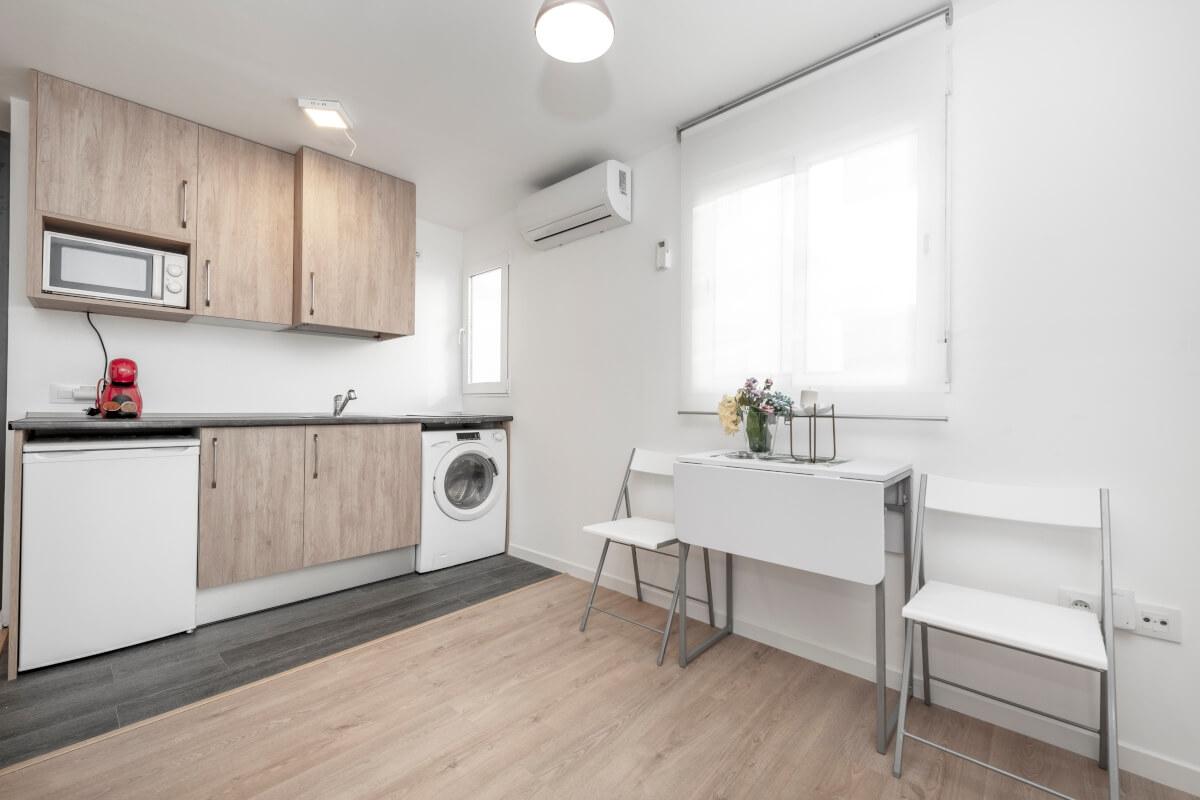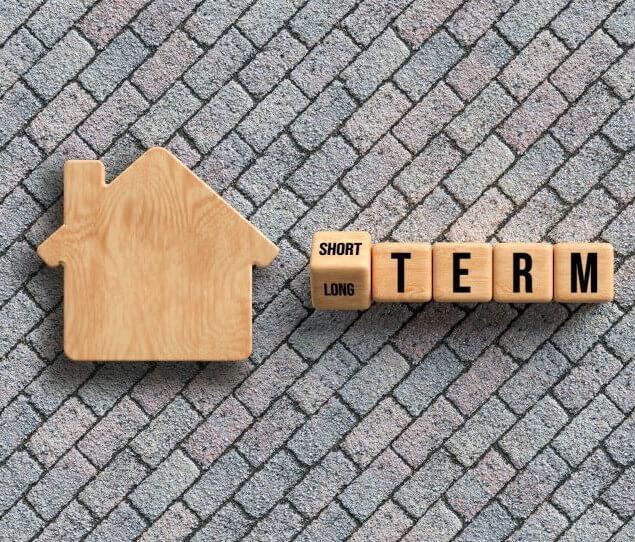As you’re searching for a new apartment, you’ll need to consider the possible lease lengths to decide what’s best for you. Many apartment communities offer both long-term and short-term leases. First, let’s discuss what these lease terms mean and how they’ll affect your rental journey.
Key Takeaways
- If you plan to stay for less than one year, go short-term; if you’re going to live there for more than one year and want lower cost, go long-term.
- A short-term lease is typically six months or less, but any lease under a year qualifies.
- A long-term lease is usually 12 months or more, but can be 13 months, 15 months, or longer.
- On Apartments.com, you can easily find short-term leases and compare costs for different lease lengths.
What Is a Short-Term Lease?

Typically, a short-term lease refers to an apartment rental agreement with a duration of six months or less. However, any lease under a year is technically considered short-term.
A popular short-term lease length to consider is month-to-month. Renting month-to-month means that after one month’s time, you can either renew your month-long lease or inform the landlord or property manager that you are ending your lease. Typically, month-to-month leases automatically renew until you give your landlord notice that you are ending your lease, so you don’t have to keep signing a new lease every month.
If you don’t plan to renew your lease agreement for another month, you will need to inform the landlord with a notice to vacate ahead of time. The proper notice period is usually 30 days prior to your lease’s end.
How can I find a short-term lease?
Short-term rentals are most common in areas with high demand and a lower supply of rental properties. For instance, New York City is known for its ever-growing population and higher-than-average monthly rent, so you’ll often find short-term leases available in New York and other big cities such as Chicago, Boston, Los Angeles, etc. Short-term rental agreements in these cities often occur in monthly increments, such as three-month, six-month, or nine-month leases.
Who typically needs a short-term lease?
A short-term lease is best for people who are unsure if they can make a year-long commitment to living in one place. Whatever your situation, short-term leases can be a great option to live somewhere without being tied down.
Pros of a Short-Term Lease
If you’re debating whether a short-term lease is right for you, consider these pros:
- Flexibility: Flexibility is one of the main benefits of short-term renting as you can move whenever you want. If you enjoy not being tied down to a year-long commitment, then you don’t have to put down roots with a short-term lease.
- Time to Adjust: Say you’ve just moved to a city and aren’t familiar with the area. You may not want to sign a long-term lease without really knowing what part of the city you want to live in. Signing a short-term lease will allow you the time to decide what and where your perfect apartment is, whether it’s the one you’re currently living in or another one across town.
Cons of a Short-Term Lease
Money-wise, a short-term lease may not be as budget-friendly as a long-term lease. If you’re on a strict budget, you might want to consider the cons of short-term leasing:
- Higher Rent: Because short-term rental agreements provide less stability and more vulnerability for landlords or property managers, they often charge more for short-term leases. As a renter, your monthly rent will be higher.
- Frequent Lease Changes: If you’re renting month-to-month, you can expect possible rent increases after each period. Your landlord cannot change your rent throughout your lease, but because you sign a new lease every month (or every few months), your rent is not definite and can change each month.
What Is a Long-Term Lease?

A long-term lease is an apartment rental agreement with a duration of 12 months or more. Typically, a long-term lease is considered a year-long agreement, but there are 13-month, 15-month, and longer lease lengths available.
Is a long-term lease right for you?
Long-term leases are right for those planning to stay in the same area for a year or longer. They’re a great choice for renters who value stability and want to lock in their rate without worrying about frequent renewals.
Pros of a Long-Term Lease
If you prefer renting but plan to stay in one area for a year or more, a long-term lease might be ideal. There are plenty of perks that come with long-term leases:
- Apartment Personalization: With a longer lease, you’ll have more time to make your apartment feel like a home. You can furnish and decorate it to make it as homey as possible since you know you’ll be there for a while.
- Fewer Moves: If you dislike moving, then long-term leases are great. Signing a longer lease means you’ll have more time before you have to move again.
- Lower Rent: long-term leases usually have lower monthly rates to encourage renters to stay for lengthy periods.
Cons of a Long-Term Lease
If you’re not a fan of commitment or additional fees, here are some cons you need to consider for a long-term lease:
- A Longer Commitment: A long-term lease means that you have to stay put in this rental for at least 12 months (or however long you signed for).
- Consequences for Breaking the Lease: If you decide that you need to move before your lease is up, you’ll have to pay rent and move-in fees at your new place plus the monthly rent for your old apartment. Alternatively, you can risk breaking your lease and dealing with the consequences that come with it. Carefully review the early termination clause in your lease as it outlines what will happen and the penalties you will face.
Short-Term Leases vs. Long-Term Leases
|
|
Pros |
Cons |
|
Short-Term Lease |
Flexibility |
Higher rent |
|
|
Time to adjust |
Frequent lease changes |
|
Long-Term Lease |
Apartment personalization |
Longer commitment |
|
|
Less moving around |
Consequences for breaking the lease |
|
|
Lower rent |
|
Short-Term Leases on Apartments.com
Apartments.com simplifies short-term leasing, from finding options to comparing prices. To find short-term lease options, go to the filter menu. Scroll down to “Additional Specialties” and check the box that says “Short-Term.” Another menu will appear where you can select the exact lease length you are looking for.
As you’re deciding between a short-term and long-term lease, Apartments.com shows you the cost difference between the two for the same unit. Under the floor plan you like, select the “View More” button under the “Unit Details” header. Once the unit view menu pops up, select “Pricing Details” at the top.
In Pricing Details, you can choose how many applicants and the lease length that you are looking for. The rent price will change according to the lease length that you have selected. Additional fees and charges are listed below, so you know exactly what you’ll pay. Apartments.com even breaks it down into the total monthly cost and one-time fees to give you all the financial information you need.
This article was originally published on May 19, 2023.
FAQs
Can I switch from short-term to long-term mid-lease?
In most cases, you can’t switch from a short-term to a long-term lease until your current lease ends. If you’re renting month-to-month, you can switch to a longer lease length after the month is up as long as you follow proper notice procedures and speak with your landlord.
Do landlords prefer long-term tenants?
Landlords and property managers typically prefer longer apartment leases. This way, they can keep tenants living in the property for a longer period of time without having to worry about finding a new tenant to fill the unit. This provides the landlord with more security and stability as they get a guaranteed check coming every month for one year or longer.
To incentivize renters to sign long-term leases, landlords will usually offer lower monthly rates for longer lease lengths.
How long is a short-term lease?
Short-term leases are commonly six months or less, but they include anything less than a year.
How long is a long-term lease?
Long-term leases are any lease lengths that are a year or more.






